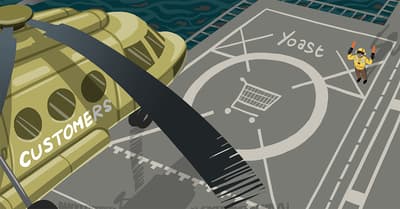How to optimize a landing page for users

Landing pages are a very important part of your website. And if you optimize them, you can really boost your conversion rate. Obviously, you should tailor this page to your preferred audience, but there are a number of things that go for all landing pages. In this post, we’ll go over some best practices to get you going!
First of all, what is a landing page?
A landing page is a common asset of a marketing campaign. Visitors land on it from sources like a newsletter, social media or ad. It’s optimized to evoke a certain reaction from visitors, such as signing up for an event or subscribing to a newsletter. They can be but aren’t necessarily the same as the pages listed in your Landing pages report in Google Analytics, which are a list of pages that get the most traffic from external sources. Of course, you can do quite a few different things for your landing page to gain more traffic on it. But in this article, we’ll focus on how to increase the conversion rate of it.
Focus your landing pages
Focus is especially important on your landing pages since this is where you’re selling your products, offering your service, or establishing your expertise! Make sure you only have one point of focus on and not a lot of different things. If people come to your landing pages because they are looking for the ballet shoes you are offering on your website; you want to optimize your landing page in a way that guides them to your checkout.
For most landing pages it’s usually pretty easy to figure out what you want people to see most prominently. If you’re selling a product, your landing page for that product should focus on the ‘Add To Cart’ button, also known as the call-to-action. Think about the placement, color, and text of your call-to-action. We’ve said this before.
Headlines of your landing page
Your landing pages have to be very clear about your product from the start. People’s attention span is short, especially when they’re online, so you have to make sure you tell all the important stuff first and tell it as fast as possible.
Make sure to optimize your headline and tagline. These should clearly communicate the core goal of your product. Create a headline for your landing page that attracts your visitors’ attention. Below that could be a tagline that brings home the message of your headline. Writing decent headlines and taglines is a science on its own, so you’d better test which ones work best!
Images
Images are said to have a significant impact on navigating your visitor from your landing page through your website. If you’re selling physical products, having decent images on your landing pages can have a really big impact. This way people will better understand what they’re buying. It’s a replacement for actually touching and seeing a product in a physical store.
An excellent way to increase people’s understanding of your product is by having pictures of people using your product on your landing page. People can envision themselves using the product then as well. Beware of the dangers of this, though: using people in pictures will almost always result in facial distraction. Make sure the people in the pictures are looking the right way.
Payment options
Nowadays, your eCommerce site needs to support the most common payment options. And if people see your landing page has (multiple) trustworthy credit card logos, they’ll feel safer on it! But most importantly, about 60% of your visitors will just abandon their transaction if their preferred payment option isn’t or appears not to be available. So make sure these signs and logos are easy to find on your landing pages.
Social proof: testimonials
Wikipedia gives the following description of the term ‘social proof’:
“A psychological phenomenon where people assume the actions of others in an attempt to reflect correct behavior for a given situation.”
This means that people will try to copy the behavior of others. And if you show them others who were (very) happy with your product, this will convince them to use it as well. One way to do this is by showing testimonials on your landing pages.
Another way to do this is by showing how many other people have already used your product. This is often used for newsletter subscriptions, for example. Because, if that many people subscribed, it must be really great, right?
Safety signs and security seals
Safety signs are security seals and logos that increase the trust of your visitors. They make sure people feel like your landing page is a safe place. Of course, some safety signs seem to be more effective than others. Though, having a security sign works better than having none.

CXL did a great article on which seals work best, go read that one as well.
Summarizing
So, to summarize, make sure to optimize your landing pages by using (the right):
- Focus
- Headlines
- Images
- Payment options
- Social proof
- Safety signs
All these things require some actual thought and testing before you’ll know what works specifically for your website. So make sure you put some thought into this and test different versions before deciding what to go with. Good luck optimizing your landing page!
Read more: The power of the landing page in Google Analytics »


Discussion (14)